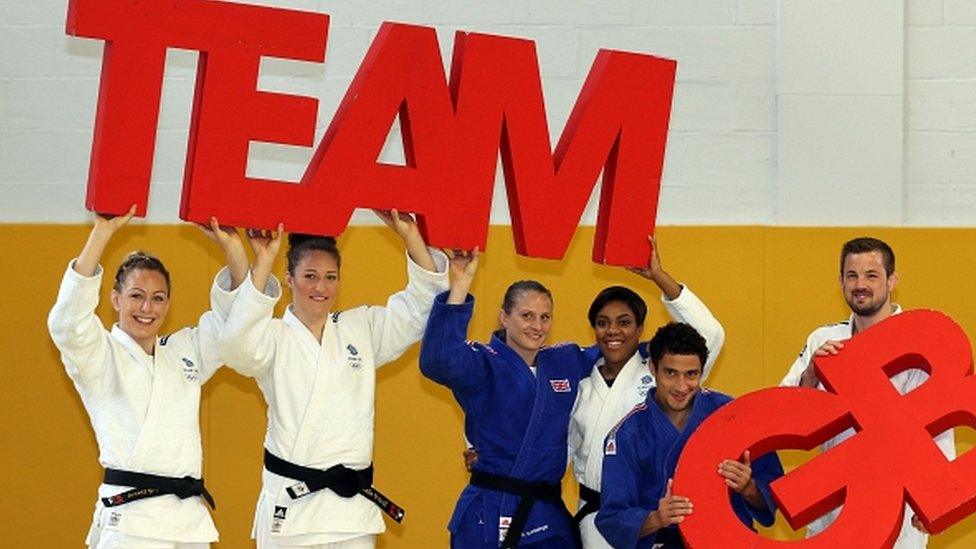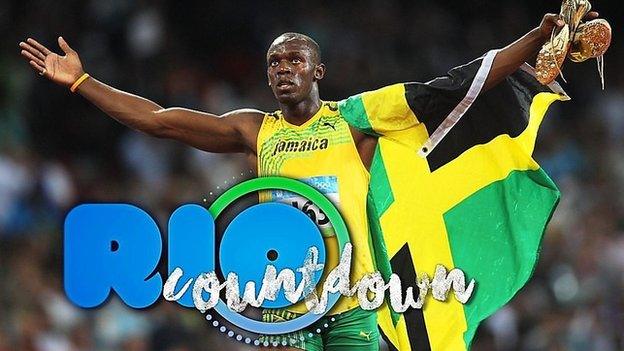Rio 2016 Olympics: Sport-by-sport guides and iPlayer catch-ups
- Published

Follow BBC Sport's comprehensive guides to every event at the Rio 2016 Olympics
Olympic Games on the BBC |
|---|
Venue: Rio de Janeiro, Brazil Dates: 5-21 August Time in Rio: BST -4 |
Coverage: Watch on BBC One, BBC Four, Red Button and up to 24 HD video streams on mobile, desktop and connected TVs, plus follow on Radio 5 live and via live text commentary. |
Missed your favourite events at Rio? You can catch up on every sport on iPlayer (UK only) and find out more about each sport here.
Archery: It hit the target during London 2012 as the most-watched sport on American TV network NBC during the opening week of the Games. Individual matches are best-of-five sets, with archers shooting three arrows each per set, while the team event is best-of-four sets.
Athletics: The oldest Olympic sport, with winners of a sprint race recorded as far back as 776 BC, athletics has remained the pre-eminent spectacle since the first modern Games in 1896. No other sport provides more medal opportunities, with 47 titles on offer in track, field and road events.
Badminton: Badminton became an Olympic sport in 1992. There are five gold medals on offer: men's and women's singles and doubles, and mixed doubles.
Basketball: Olympic basketball is a simple game; teams of five people on court at any one time throw a ball around for 40 minutes and, at the end, the Americans always win. Well, nearly always.
Boxing: There are 10 weight categories for men and three for women, with professional boxers allowed to compete in the Olympics for the first time. The competition has a straight knockout format, with the scores from three judges deciding the winner of each bout.
Canoeing: In canoe slalom, paddlers compete against the clock on a 250m white-water course, passing through gates and avoiding obstacles. Canoe sprint events are head-to-head races in lanes along a still stretch of open water.
Cycling: There are four cycling disciplines at the Olympics: track, road, mountain bike and BMX. Track riders hurtle around a steep-banked oval indoor track, BMX riders try to outpace and outmanoeuvre one another over a 400m obstacle course, while road and mountain bike events are a test of endurance as much as speed.
Diving: A series of twists and somersaults are performed at speeds of up to 35mph. There are four events each for men and women, split between two heights: a springboard 3m above the water, and a rigid 10m platform.
Equestrian: Eventing, dressage and jumping make up the Olympic equestrian events. Dressage is described as ballet for horses, and eventing is the triathlon of the horse world.
Fencing: A knockout format, with the aim being to hit without being hit. There are three weapon types: epee, foil and sabre.
Football: The competition takes place across seven venues in six cities. There are no age restrictions for women but only three men in each squad can be over 23.
Golf: Making its Olympic comeback in Rio after an absence of 112 years. The format consists of the standard four rounds of 18-hole strokeplay scheduled over four consecutive days.
Gymnastics: Artistic gymnastics has been a fixture of every Olympics since the inaugural modern Games of 1896; trampoline was introduced during the Sydney Games in 2000.
Handball: Seven-a-side game played on a large indoor court measuring 40m long by 20m wide. Matches consist of two 30-minute halves and the aim is to throw the ball into the opposition's goal.
Judo: The translation of judo may be 'the gentle way' but the ultimate goal is to win by either throwing an opponent forcibly on their back, holding them down for 20 seconds or forcing a submission.
Hockey: The format of matches has changed from two halves of 35 minutes to four 15-minute periods. In the knockout stage there is no longer extra time, with matches going straight to a shootout.
Modern pentathlon: Created by the founder of the modern Olympics, Pierre de Coubertin, in order to produce "a complete athlete". There are five events on the same day: fencing, swimming, horse riding, shooting and running.
Rowing: Great Britain has won rowing gold at every Olympics since 1984. Both forms of rowing are tested: sweep (where rowers use one oar each) and sculling (where they use two).
Rugby sevens: Makes its Olympic debut at Rio 2016. There are seven players per team, with matches over two seven-minute halves. The scoring system is identical to rugby union.
Sailing: Competitors sail against each other in an initial opening series of 10 or 12 races, accruing points after each race equivalent to where they finish (eg. one point for coming first).
Shooting: In pistol and rifle events, shooters aim at a 10-ringed target from a set distance: 10, 25 or 50m. In the shotgun events, competitors shoot at moving targets launched above and in front of them.
Swimming: An ever-present throughout the modern Olympics, there are 32 events in the pool, with the two 10km open-water events take place in the South Atlantic.
Synchronised swimming: One of two women-only events at the Olympics, the programme consists of duet and team competitions.
Table tennis: China have won 24 of the 28 golds in Olympic history. Matches are the best-of-seven games in singles, and best-of-five games in the team event.
Taekwondo: Athletes attempt to score points with kicks to their opponent's head and kicks or punches to the torso. Each blow is worth between one and four points.
Tennis: All matches are best-of-three sets - except for the men's singles final, which is best of five. Tie-breaks will be used in the deciding set in singles and men's and women's doubles matches.
Triathlon: Men and women compete over the same distances: a 1500m open water swim, 41.6km bike ride and 10km run.
Volleyball: The indoor event will be held at the Maracanazinho, called the 'spiritual home of sport in Brazil'. The famous Copacabana beach provides the venue for the beach tournament.
Water polo: Played by teams of seven in matches of four eight-minute periods. Rio 2016 matches will not feature extra time and will go straight to a shootout.
Weightlifting: Competitors have three attempts to lift as much weight as they can in two types of lift: a snatch, where the barbell is lifted above the head in one go, and a clean and jerk, where it is lifted in two movements.
Wrestling: The sport of wrestling was a staple of the ancient Games. Use of the legs to try to hold or trip opponents distinguishes the two disciplines - it is allowed in freestyle but not Greco-Roman.
Subscribe to the BBC Sport newsletter, external to get our pick of news, features and video sent to your inbox.
- Published18 August 2016

- Published3 August 2016

- Published19 July 2016

- Published1 August 2016

- Published13 May 2016

- Published19 July 2016
